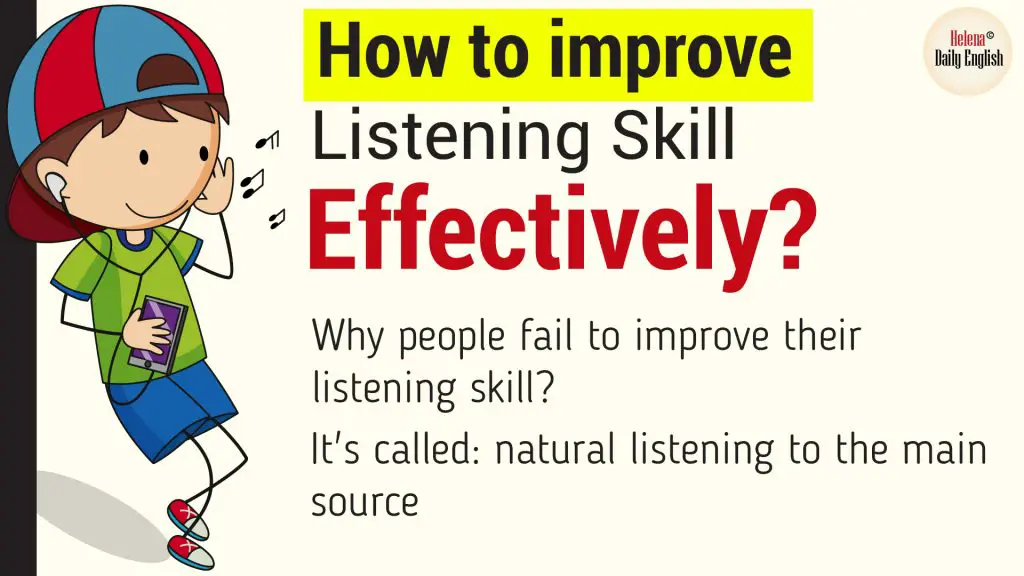Ways to Leverage Your English Listening Habits
The English Language has a lot of slang, colloquialisms, and idioms. The only way to
master these is by listening. Listening will improve your speaking capabilities hugely.
You will learn the correct pronunciation, vocabulary, grammar, accent, and intonation.
One can apply what you hear in your daily life.
– Make it a point to listen to the radio, or T.V. while doing random chores.
All human beings learn a language by listening. Make sure you watch a movie
without subtitles.
– Singing is a great fun way to improve your pronunciation. It can also
develop fluency.
Remember, developing your English listening skill is not only important to learn to
language. It is also important because a person is not going to repeat himself over and
over waiting for you to understand. Watching a movie without subtitles will teach you
how to keep up with what a person is saying.
– Role-playing also helps in improving speech. Watch an English movie that
you are fond of over and over again till you understand it complete, and then
enact the movie yourself. Repeat this exercise with another movie. This will
not only improve your speech, it will also improve your ability to listen.
Listening and repeating is the best way to learn a language. I know people who have
learned a complete language perfectly just by watching the movies and listening to the
songs. Of course, this works better if the language you are trying to learn is closer to
your own native language. However, remember that English is a mix of a number of
different languages.
How to Speak English Fluently like American Speakers in one Month
Read more: Learn English through Movies – 4 Tips, New method and Tool
How to Strengthen English Listening Habits?
Now, in order to strengthen your English listening habits for an extra leverage, let us
take a look at the three types of listening one must indulge into and further ways to
improving your skills in each.
Read more: How to Improve Listening Skill Effectively? (without spending extra time)
Type 1: Passive or Inactive Listening
Passive listening plays a dormant role in the communication process. The listener
simply listens and absorbs the meaning of the language and is not expected to react or
put his views across. As a foreign learner, passive listening allows you to acquaint the
verbal form of speech and take time to assimilate what you listen. It is the most
comfortable way of taking massive input. Here are some important aspects you can
instill to maximise learning from passive listening:
Focus on understanding each word in individual sense and in correlation with the
constructed sentences. Do not deviate your concentration in putting emphasis on
preconception of the context while listening.
● Rehearse and summarise in your mind what you comprehended from the
speech as an aftermath.
● Take note on how vocabulary is used interchangeably to get a hand on
varied ways of expressive ability.
● If possible, pen down the main frame of sentences in short hand for further
reference.
● Keep observation on the pauses used while conveying the emotion of the
context. There are clause, sentence and paragraph pauses in conversational
speech in a rhythmic pattern which you must focus on while listening English.
● As a foreign listener, at times the speech might sound out of your pace to
absorb the meaning of it. Do not get intimidated with the volume of words and
sentences while listening as it might keep you from taking whatever input you
can anyway.
● In case of listening live to a speaker, note the lip movement made while
pronouncing the syllables, vowels and consonants differently.
Type 2: Extensive Listening
Furthermore and beyond specific information, Extensive listening includes listening to
long textual narratives which in return builds the listener’s stamina to take in more and more bulk of conversational language and understand the contextual reference in larger lengths. After listening to a particular audio book on repetitive mode, you will observe that you are consciously picking up the pronunciation and can fairly summarise the meaning in portions. Extensive listening is a great self tutoring method for learning second languages. While making extensive listening a habit, keep the following points in mind for exceptional learning.
● Use different mediums like English audio books, recordings, videos,
entertainment pieces, musicals, debates and dialogues for extracting a variety
of accents, speech alterations and genres of vocal English.
● To avoid hurtling up while listening extensively, pick a topic of interest and
listen through till the end.
● Since mostly you can repeat and take a pause while listening to prerecorded mediums, list down new words and phrases you come across and
look up for the meaning of complex vocabulary to keep up with the flow of
speech.
● One of the best way to keep a log of different pronunciations while listening
to voluminous text is to pen down the words as they sound. This will give you
an edge on the phonic tone to understand what you listen better.
Practice to listen English through Helena’s channel
- English Listening Practice | Proficiency Level | Improve Vocabulary & Listening Skills
- English Listening Comprehension Practice: 30 Advanced Topics
- English Listening Practice (Intermediate Level -1h): daily topics
Type 3: Responsive Listening
In interpersonal communication, responsive listening is the half kernel of the two-way process. Now as a non-native learner, getting into habit of responsive listening is a place where you are active as a listener as well as a speaker. Engaging yourself with
this type of listening will build your grasping speed and make you spontaneous with the
language. Once you start practising it as a habit, you can further optimise listening
through these elements:
Responsive listening is a behavioral act. Keep the focal point on listening calmly
rather than getting anxious about how you would frame your response.
Ask the speaker to reiterate if you do not get the context clearly. It is always better and
elucidating to seek clarification rather than responding in irrelevance.
Take time to apprehend what you listen before jumping to a response
It is observed that very often people practice prejudiced listening and neglect the
minutes. As a settler to the foreign language, you must keep a flexible and open mind
while listening so as to ingest the actual meaning of what is being spoken.
“Do It Right Now”: Steps to Start Improving instantly
Step 1: Watch an English movie
Step 2: Make an honest list of all the words that you thought were pronounced in a
different way.
Step 3: By the end of the movie, if your list is small, your pronunciation is not so bad.
However, if your list is long, you need to work on pronouncing those words.
Step 4: If you are not sure about the pronunciation, use the help of Internet tools or
download a dictionary app on your phone to help with correct yourslf
Author: Edward Clemons
According to the book: How to Speak English Fluently in 1 Week
English Book: The New Oxford Picture Dictionary (Pdf) Download



